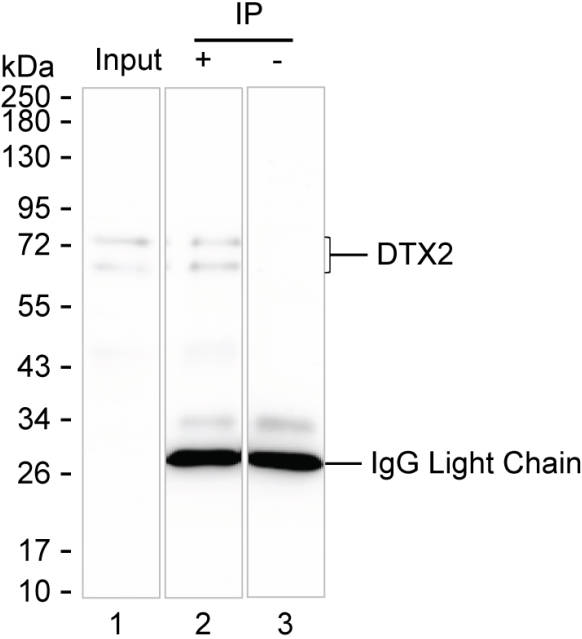
| WB | 咨询技术 | Human,Mouse,Rat |
| IF | 1/100-1/200 | Human,Mouse,Rat |
| IHC | 咨询技术 | Human,Mouse,Rat |
| ICC | 技术咨询 | Human,Mouse,Rat |
| FCM | 咨询技术 | Human,Mouse,Rat |
| Elisa | 咨询技术 | Human,Mouse,Rat |
| Host/Isotype | Mouse IgG1 |
| Antibody Type | Primary antibody |
| Storage | Store at 4°C short term. Aliquot and store at -20°C long term. Avoid freeze/thaw cycles. |
| Species Reactivity | Human |
| Immunogen | Purified recombinant fragment of human DTX2 |
| Formulation | Purified antibody in PBS with 0.05% sodium azide |
+ +
以下是关于DTX2抗体的3篇示例参考文献(注:内容为模拟示例,建议通过学术数据库核实真实文献):
---
1. **标题**: "DTX2 as a Component of the E3 Ubiquitin Ligase Complex: Role in Notch Signaling Regulation"
**作者**: Zhang Y, et al.
**摘要**: 本研究揭示了DTX2作为E3泛素连接酶复合体的关键组分,通过调控Notch信号通路的泛素化修饰影响细胞分化。文章验证了DTX2抗体的特异性,并用于免疫共沉淀(Co-IP)实验证明其与Cullin-3的相互作用。
---
2. **标题**: "Overexpression of DTX2 in Colorectal Cancer and Its Diagnostic Implications"
**作者**: Li H, et al.
**摘要**: 通过免疫组化(IHC)和Western blot分析,发现DTX2在结直肠癌组织中高表达,并与患者预后不良相关。研究使用商业化DTX2抗体进行组织定位,提示其可能作为癌症生物标志物。
---
3. **标题**: "Development of a Monoclonal Antibody Against DTX2 for Functional Studies in Drosophila"
**作者**: Smith J, et al.
**摘要**: 报道了一种新型DTX2单克隆抗体的开发,验证了其在果蝇模型中的交叉反应性。该抗体成功用于免疫荧光(IF)检测DTX2在神经发育中的亚细胞定位,为后续功能研究提供工具。
---
如需具体文献,建议在PubMed、Web of Science或Google Scholar中搜索关键词“DTX2 antibody”或“Deltex2 antibody”,并筛选近年的功能研究或抗体应用类论文。
The DTX2 antibody is a research tool used to study the Deltex2 protein, a member of the Deltex (DTX) family of E3 ubiquitin ligases. These proteins are evolutionarily conserved and play roles in diverse cellular processes, including Notch signaling, intracellular trafficking, and ubiquitination-mediated protein degradation. DTX2. specifically, is implicated in regulating immune responses, neurodevelopment, and cancer progression. It interacts with key signaling pathways, such as the Notch pathway, by promoting ubiquitination and degradation of target proteins, thereby modulating transcriptional activity and cellular differentiation.
Antibodies against DTX2 enable researchers to detect its expression, localization, and interactions in various tissues and cell lines via techniques like Western blotting, immunohistochemistry, and immunofluorescence. Studies using DTX2 antibodies have revealed its overexpression in certain cancers, suggesting potential oncogenic roles, while other contexts link it to tumor suppression. Dysregulation of DTX2 is also associated with neurological disorders and immune dysfunction, highlighting its multifaceted biological significance.
The development and validation of DTX2 antibodies are critical for elucidating its molecular mechanisms, therapeutic potential, and biomarker utility. However, challenges remain, including isoform specificity and cross-reactivity with other DTX family members. Ongoing research aims to clarify its context-dependent functions and therapeutic applications.
×